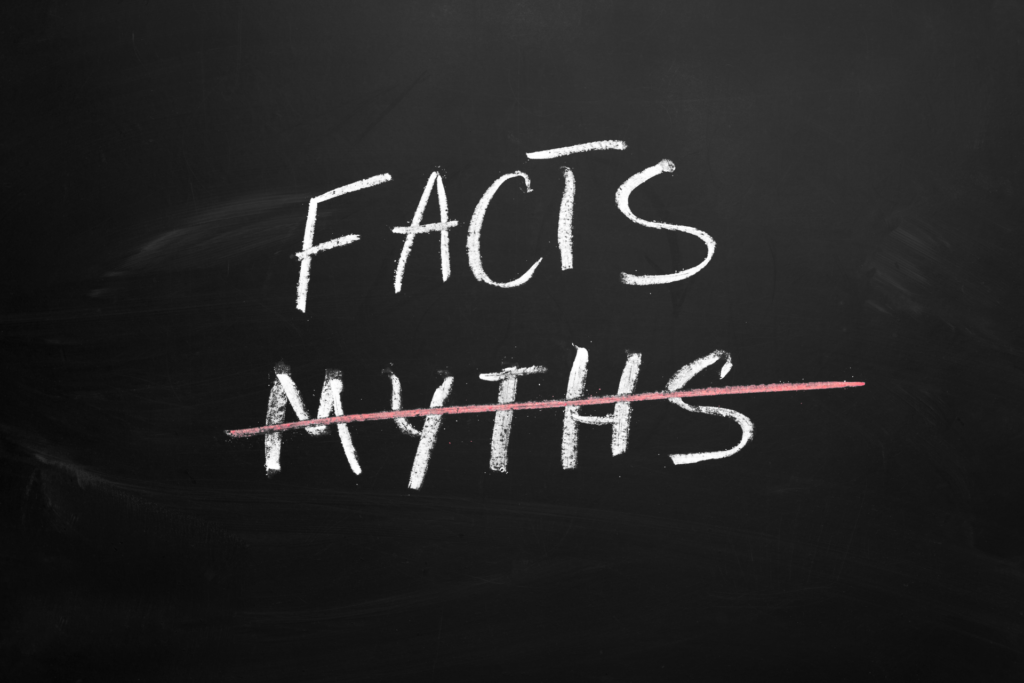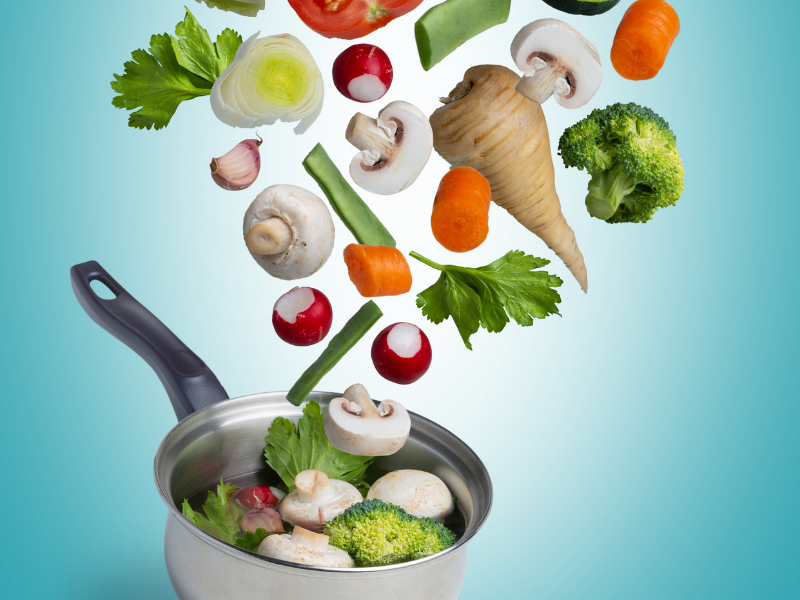Common nutrition myths are everywhere. There is so much noise in the nutrition space, and it can be difficult to sift through the myths to find the facts. Nutrition myths are everywhere, commonly dressed in appealing or dramatic claims.
So much information is out there, and much of it is flawed, misinterpreted, or flat-out false. Sifting through the myths to find the facts can be challenging.
Here are five common nutrition myths and the facts behind them.
Common Nutrition Myth 1:
Carbohydrates cause weight gain.
Fact:
No one nutrient, food, or food group causes weight gain.
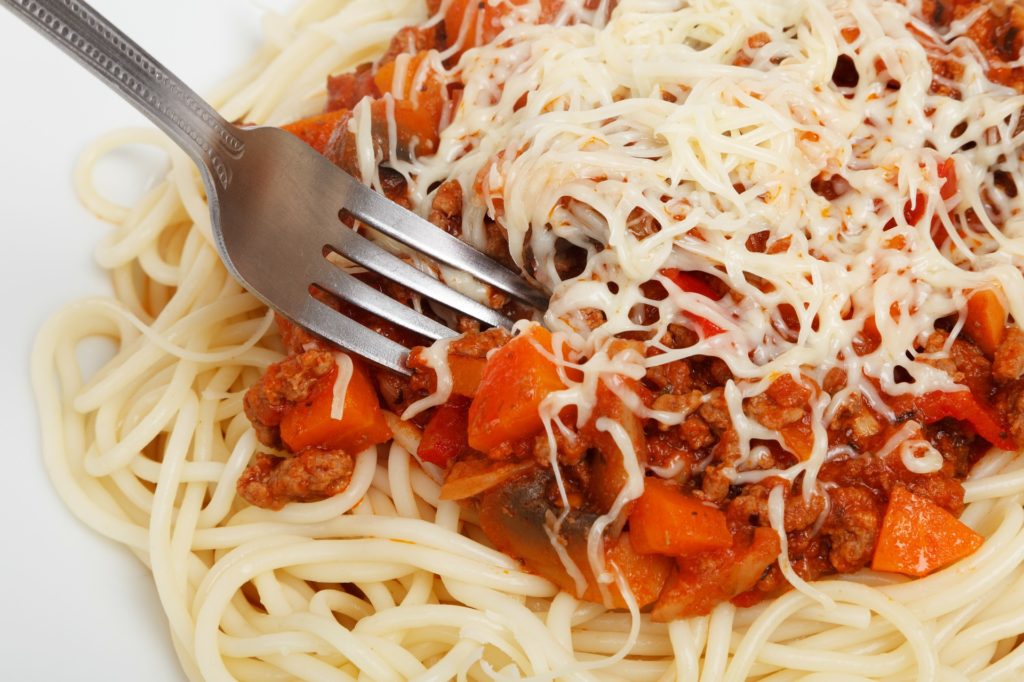
Weight gain is complex and cannot be attributed to just one food or food group. In general, weight gain will result when we consume calories in excess of what our body needs to maintain body weight. However, there are other factors that affect body weight.
A diet for optimal health includes many foods with carbohydrates, which are our body’s preferred source of energy. When it comes to carbohydrates, consider the quality. Choose carbohydrates that offer other nutrition including fiber, vitamins, and minerals. Complex carbohydrates with fiber digest and absorb more slowly than simple carbohydrates.
Examples of high-quality carbohydrates include whole grains, fruit, vegetables, beans, and lentils.
Nutrition Myth 2:
Foods with gluten are unhealthy.
Fact:
Only some people need to have a gluten-free diet.

Another common nutrition myth is surrounds food that contain gluten. Gluten is a group of proteins found in cereal grains such as wheat, barley, and rye. People who are diagnosed by a doctor with celiac disease or non-celiac gluten sensitivity should avoid foods with gluten.
Celiac disease is an autoimmune condition in which eating gluten results in damage to the small intestine. Non-celiac gluten sensitivity is an intolerance to gluten that results in similar symptoms to celiac disease but is not diagnosed as celiac disease. With both conditions, a gluten-free diet will help manage symptoms.
For a person without these conditions, foods with gluten can be part of an overall healthy diet. Emphasize foods that offer more nutrition, such as choosing whole grains over refined grains. Whole grains with gluten include wheat berries and farro.
Myth 3:
A vegetarian or vegan diet does not provide enough protein.
Fact:
Many vegetarian foods have protein. Vegetarians and vegans can meet protein needs through careful planning.

There are many types of vegetarianism. Some vegetarians eat eggs, dairy and/or fish. Other vegetarians choose mostly or all plant floods [vegans].
Plant food sources of protein include beans, lentils, soy products (tofu, edamame, tempeh), nuts, and seeds. Whole grains also have protein, although they wouldn’t be considered a source of protein or a protein food.
Vegetarians should choose sources of protein at each meal and snack. Consult your doctor and registered dietitian about your protein needs.
Myth 4:
Snacking is unhealthy.
Fact:
Snacking can be part of healthy eating, even when weight loss is a goal.
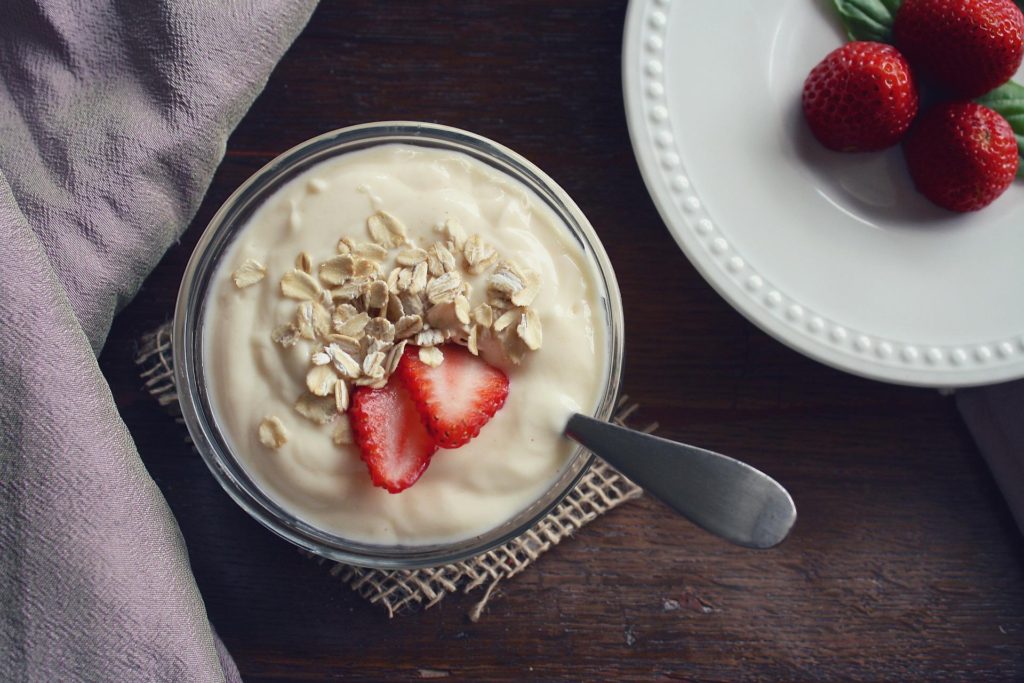
Snacking and whether it is healthy has inspired another common nutrition myth.
Depending on our needs and a meal’s size and composition, a meal with carbohydrates, protein, and fat will keep us full for an average of 3-4 hours. In general, most people have a greater time window than 3-4 hours in between meals.
Snacking can help curb hunger while providing fuel to have energy throughout the day. Choose a balanced snack with both protein and a fruit or vegetable. Examples include peanut butter and apple slices, a hard-boiled egg and berries, roasted edamame and carrot sticks, or hummus and celery sticks.
A snack with just carbohydrates, like pretzels, will be digested quickly. This may result in the quick return of hunger and may potentially lead to overeating at the next meal or snack. A balanced snack with protein, carbohydrates, and fiber digests more slowly, keeping us full for longer.
Another reason to include fruits and veggies in snacks is because many people may have trouble fitting them into mealtime. Snacks are an easy way to have an additional serving of fruits and veggies.
Myth 5:
Juicing or cleansing is necessary to “detox” your body.
Fact:
Our body has natural mechanisms through which to detox.
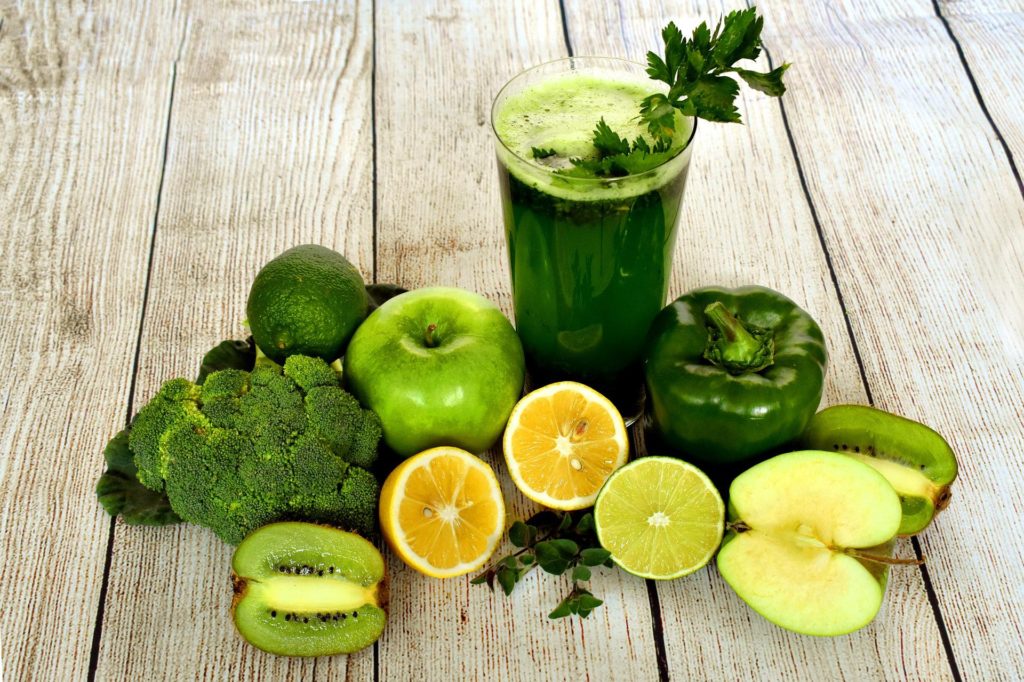
Juices or cleanses claim to aid weight loss, improve skin health, and detox the body by removing toxins, etc. However, there is no one food or diet that can deliver on these promises. In fact, some cleanses, diets, and supplements may be harmful. Talk to your doctor and registered dietitian before taking supplements or following a diet.
We do not need specific foods, drinks, or diets to detox because our body does that for us. Specifically, our liver and kidneys remove waste from our bodies while helping maintain hydration and process medicine and alcohol, among other functions. The lungs and skin are also involved in detoxification.
The best way of eating to promote overall health is a diet rich in vegetables, fruit, legumes, whole grains, and lean protein. This way of eating can include other foods too but eaten in smaller amounts less often.
What “red flags” should I look out for to avoid nutrition myths?
The internet and social media are filled with potential land mines of misleading nutrition information. Keep an eye out for these red flags:
- Read “.com” sources with a critical eye. While some may provide credible nutrition information, “.com” indicates a commercial domain, so they intend to make a profit.
- Be wary of a source that does not list an author or a reviewer, or either person does not have listed credentials relevant to the field.
- Look for a date when the article or post was published. An article or post without a published date may not provide the most current information.
- Assess whether the website or social media page sells products, including both food and supplements. Companies that sell products may be pushing their own agenda in conjunction with offering nutrition information.
- Evaluate websites and social media for marketing gimmicks. Gimmicks may include weight loss guarantees, celebrity spokespeople, extremely restrictive diets, exaggerated claims, and greenwashing.
- Listen to friends and family but do your own research. Although friends and family mean well, they may be perpetuating myths by sharing information that’s specific to their personal history or experiences.
How can I find credible nutrition information?
Credible nutrition information can seem hard to find amidst other information sources. Utilize these strategies to find information that you can count on:
- Seek out .org, .edu, and .gov sources. Read articles critically. If the information sounds too good to be true, it probably is.
- Look for pieces written by authors and/or reviewers with relevant credentials. Check the date published and peruse the source list.
- Do your own research. Rather than taking what someone else says at face value, read about the topic yourself, seeking several high-quality sources. The National Library of Medicine provides a great resource for this at PubMed.
- Instead of a single scientific study to inform your thoughts and opinions, consider the body of evidence.
- Follow dietitian bloggers and social media accounts by looking for “RD” and “RDN” after their names.
- Ask a credentialed healthcare professional like a registered dietitian or a medical doctor.
- Be open to new ideas. Like all fields, nutrition evolves. We continually learn from research studies and deepen our knowledge of nutrition science.
The Bottom Line on Nutrition Myths
Nutrition can be confusing. It is difficult to sort nutrition facts from fiction. Follow these strategies to find nutrition information and if in doubt, ask a credentialed healthcare professional like a registered dietitian. In addition, keep an open mind and maintain a healthy dose of skepticism.

